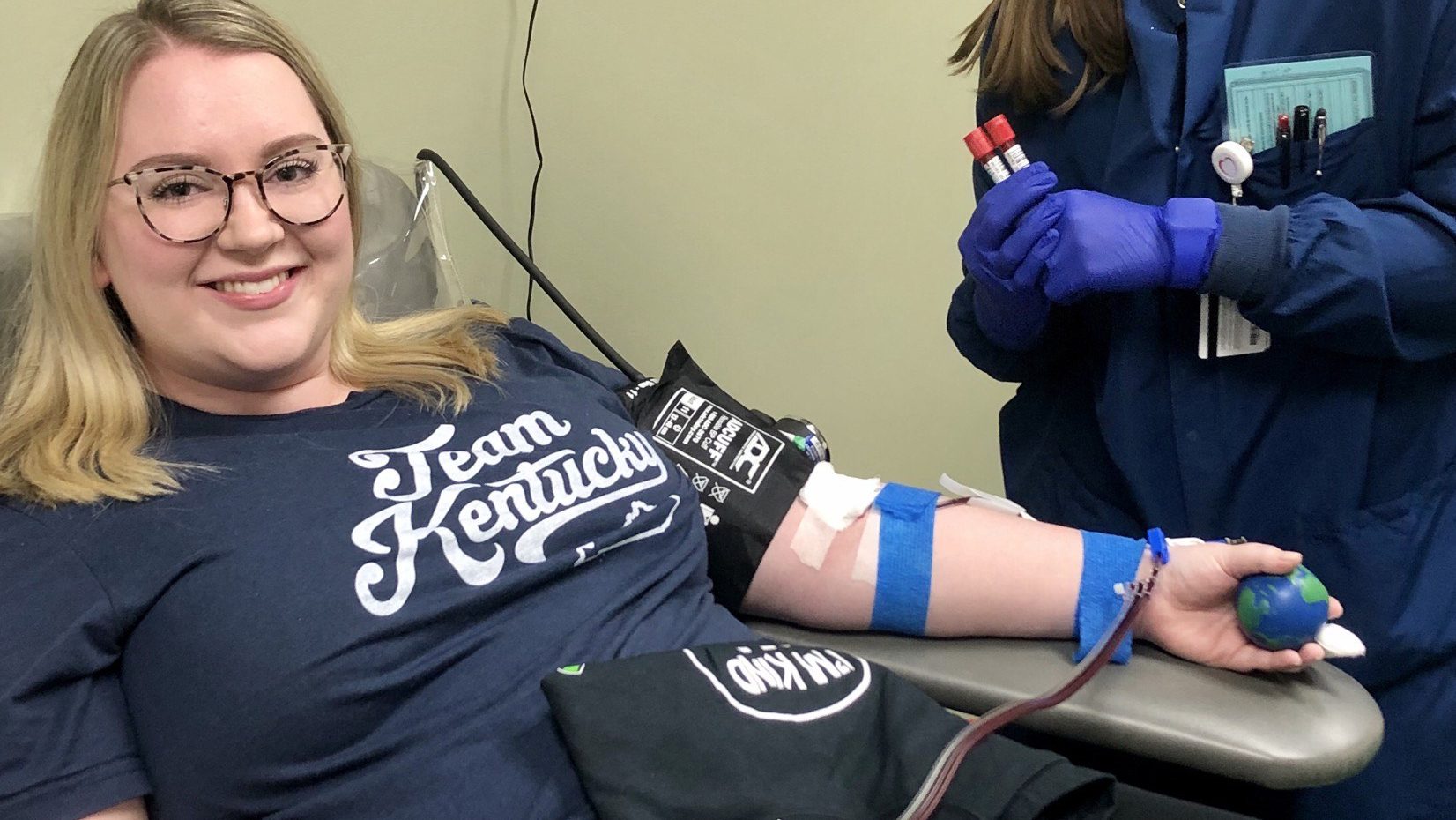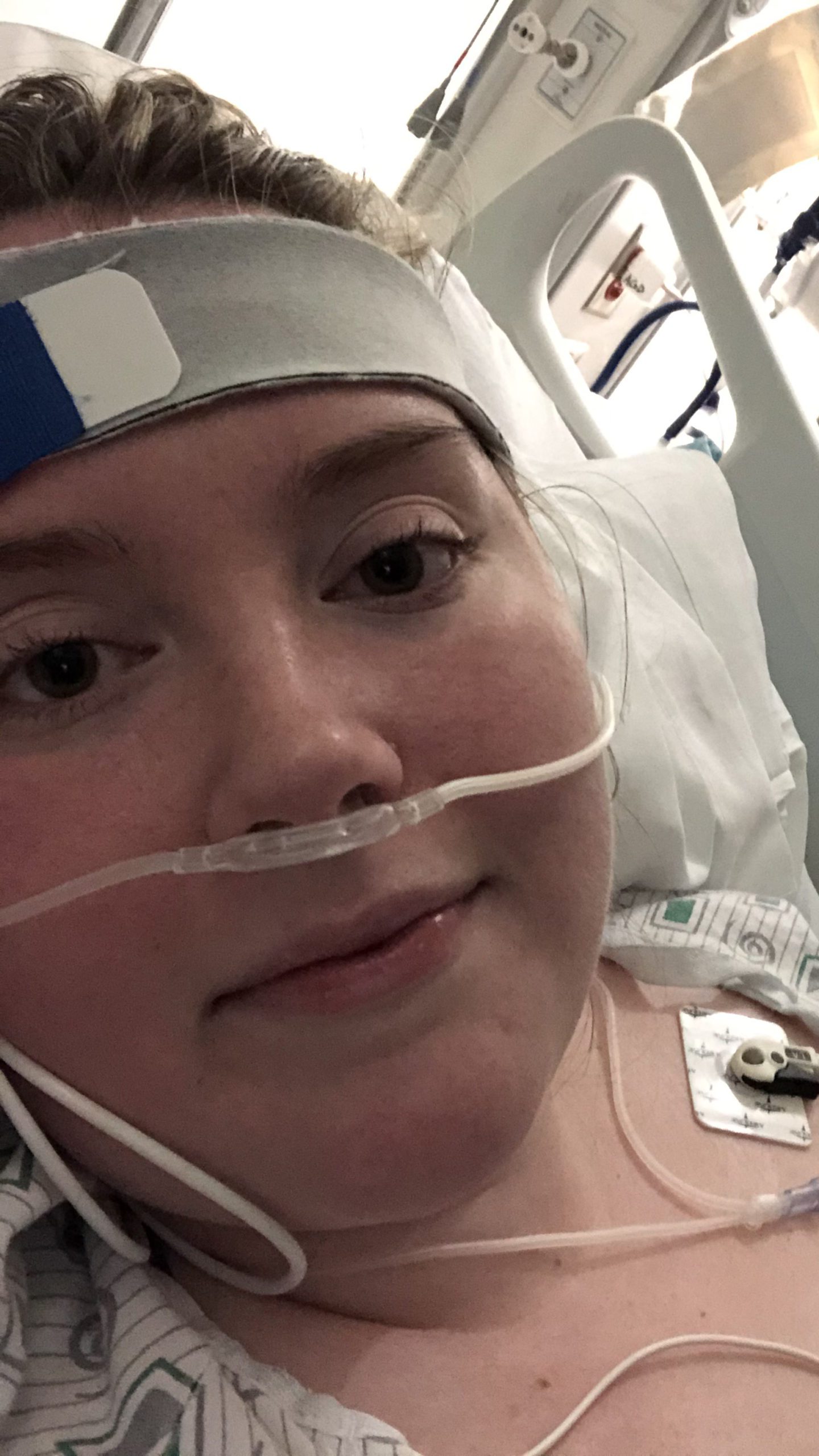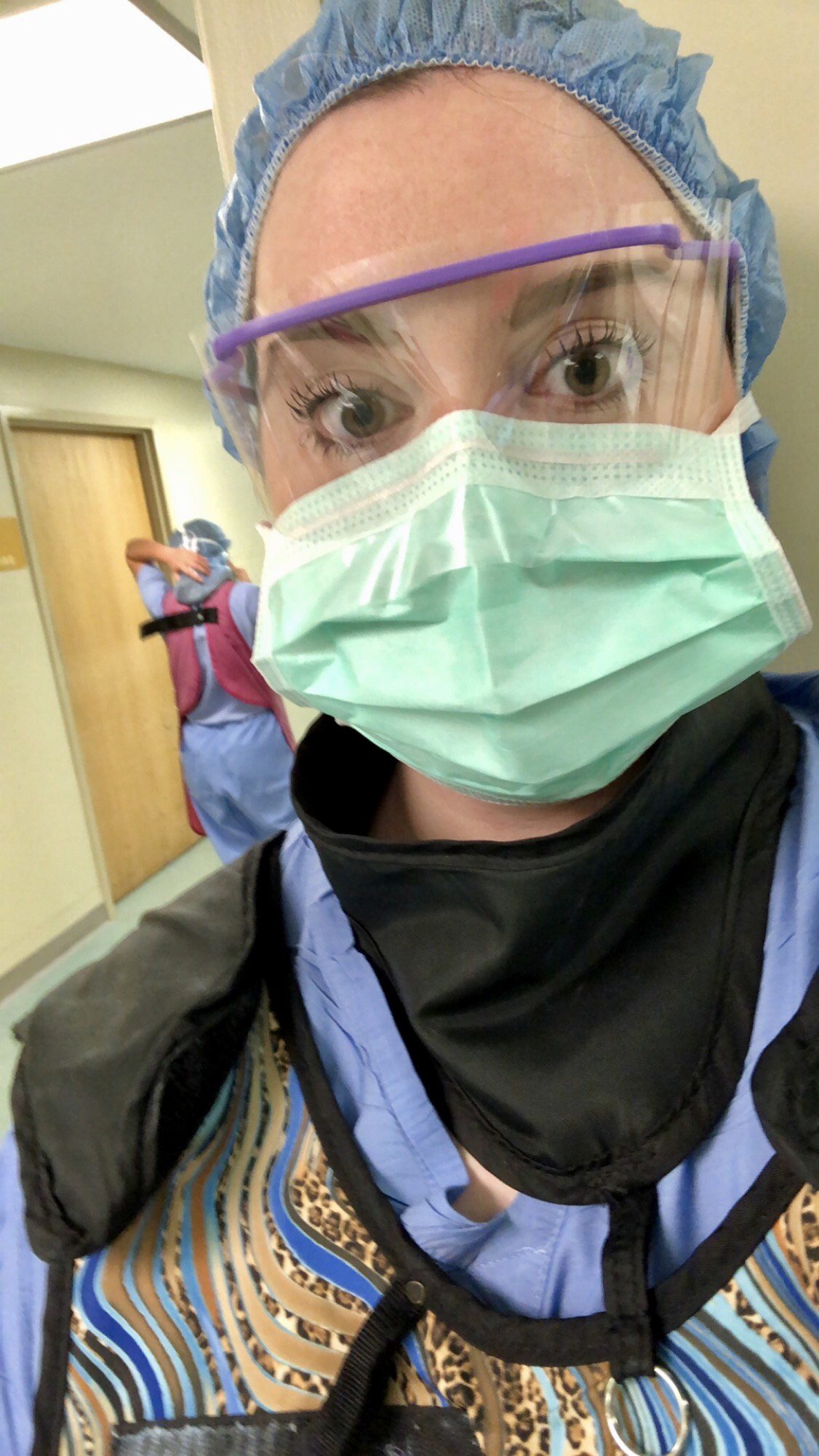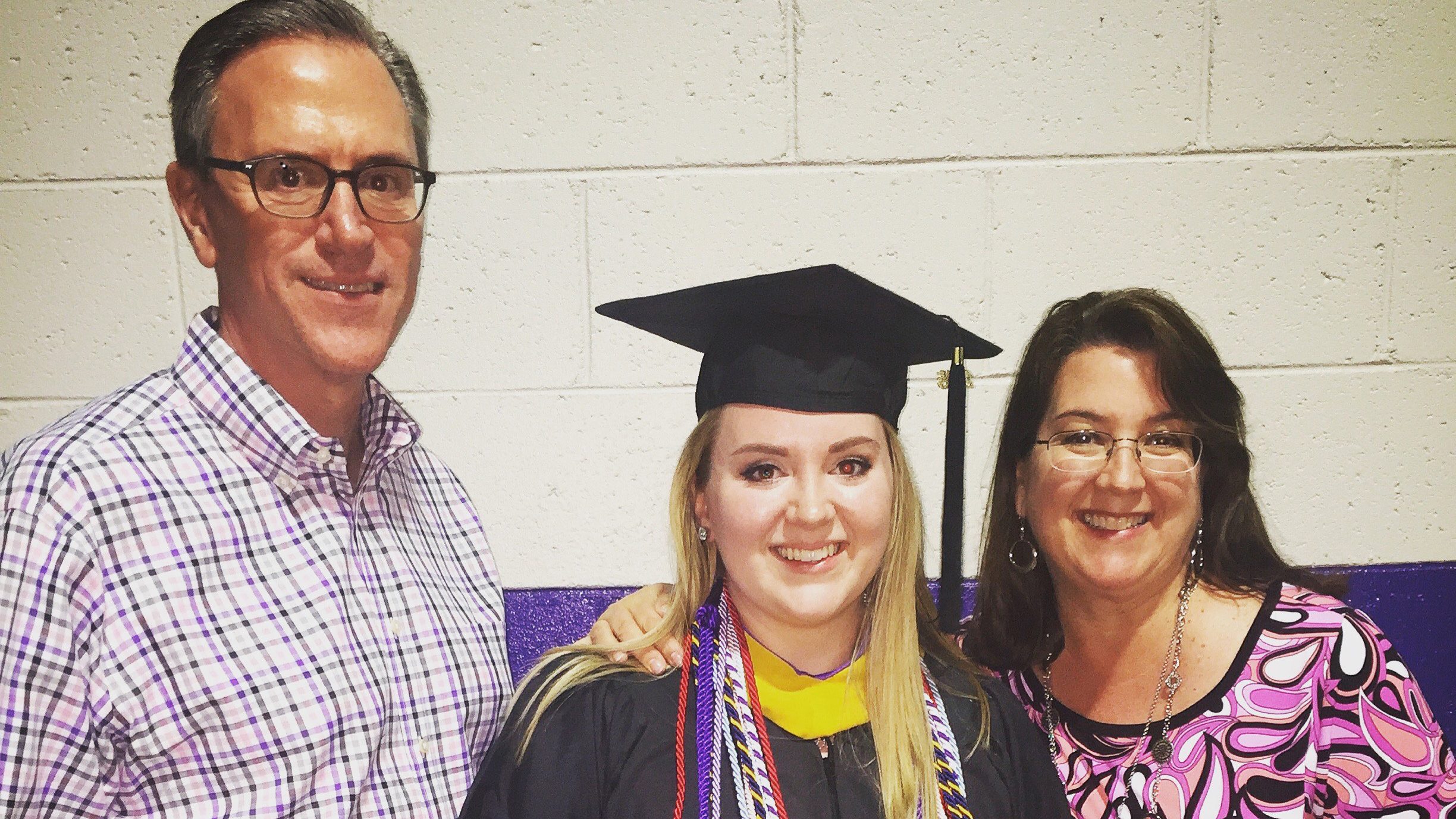Alumna pens healing words in recovery from COVID-19

Anna Downs ’16 became ill with COVID-19 in March, about two months away from graduating medical school at the University of Louisville School of Medicine. She’s still recovering, but being a health care professional struck with a deadly pandemic disease will stay with her forever. She wrote an open letter to the nurses who cared for her, which went viral on Facebook and was covered by the Today Show’s website. She also shared her story in an interview with her alma mater. Here are her words, edited slightly for clarity and brevity.
Anna’s Story
I began feeling ill on March 9. It kind of went from zero to 60. I was fine one day, then I was having really bad muscle aches and pains and a high fever up to 103, and some GI disorders.
I was at my home in Louisville just quarantining. That was before the shutdown. There weren’t a lot of conversations about protecting yourself going on. I was here for a week, and I ended up going to the student health center for a COVID swab. That was negative, so I went home to Lexington, Kentucky, where my parents live. By that point I was having a lot of trouble breathing. It had gone into what I assumed was pneumonia, and that was later confirmed. But at that point I just had to go to the ER because I wasn’t able to breath. That’s when I got a second test and that was positive. From there I was in the hospital eight to nine days. Most of that was in the ICU. It’s been wild.
This was my first time being hospitalized ever. I had never experienced anything like this.
You intellectually know what to expect. I’ve been in the ICUs as a medical student and seen how ill the patients are, seen the general protocols for severe pneumonia and things like that. So at least in a way I knew a little bit what to expect. But I was so sick and there’s so much fear and anxiety going on, especially when you can’t catch your breath, and I just continued to get sicker and sicker with really no relief of my symptoms. Unlike other ICU conditions that I know about I didn’t know what to expect, what the course of disease would look like. I was mostly in survivor mode. There was that worry, I didn’t know how this was gonna go, didn’t know how it was going to progress.
A letter that went viral (no pun intended)
I’m not much of a writer in my day-to-day life, being a med student. I have just had trouble sleeping with some anxiety after being in the hospital, and I think everyone in quarantine has a weird sleep schedule. I was lying in bed kind of processing everything, and I just kept coming back to how grateful I was for the nurses.
As a med student you’re around your resident physicians and you’re around your attending doctors, but you really just interact with the nurses on kind of a surface level. While I always respected what they did, being in that really vulnerable position and not having my parents there with me just made my interaction with the nurses that much more important. The nurses and X-ray techs and the assistants and everybody who came into my room, even environmental services who came into my room to clean — they were all really nice and supportive and wished me well. That just meant so much to me in what was probably the most difficult experience of my life. I just felt like writing it.
I sent it just to the nurses in the critical care unit I was in, because obviously they were the intended recipients. And then I just felt compelled to share it online. People really seemed to resonate with it. I’ve seen a lot of nurses commenting, saying, “Wow this encouraged me to go to work,” or wishing me well, or giving me advice as a future physician. It’s just been really great to interact and make those connections that I think will continue as I move forward in the healthcare field.
It was absolutely a very pleasant surprise. It was something I felt really passionate about and I’m glad people responded positively. I’ve heard from other people who have made it through COVID, I’ve heard from other nurses, doctors, lots of people in the healthcare field. I think it’s helped me feel connected both as a patient and as a medical student and as a soon-to-be resident.
I was trying to explain it all to my dad, who’s really not a social media person. I was telling him it got like 50,000 likes and he was like, “What really?” I’ve had a few people in my neighborhood who’ve been like “You’re that girl that was on the news.” Mostly I’ve just been home with my parents recovering. But I’m glad something that I felt passionately about was able to hopefully positively impact some people who are doing some really good work.
I was a double major in history and biology. I guess I have to thank my history department family for helping me have some decent writing skills.
Furman has shaped me in so many ways. It was the stepping stone for me to get into medical school. I did all my premed classes there, and I started out that journey with so much support at Furman that it really gave me the confidence to go to med school, and now move into my residency.
I think at another place I could have been swallowed up by all the premeds (students) or the big classes. But Furman was such a wonderful place for me.
Since I’ve been sick I’ve had several Furman professors that I’m friends with on Facebook reach out to me, so it’s been great to reconnect with them and reconnect with some of my sorority sisters. They sent me some flowers. Just knowing that while I’ve been far away and been busy with med school my Furman family still has my back.
I didn’t know a soul when I went there. It ended up being such a really great choice for me academically and socially.
What advice does she have about COVID-19?
Trust scientists and epidemiologists and trust data. I know we’re all hurting in a lot of ways but if we can continue to do the right thing it would mean a lot to me personally as a recovered patient as a Furman alum, as a future doctor. I think the Furman family is doing all the right things. We’ll get through it. That’s what I keep telling myself.
I’ve had people be like, “Was it really that bad?” Yes! I would not wish it on my worst enemy.
I think it will help me relate to my patients in a lot of ways, knowing that fear, the uncertainty. Being in the ICU is such a surreal experience in a lot of ways.
I think for some people who haven’t been directly affected by this it can be hard to grasp, and I understand that. It’s real and it’s hard and I would hate for anyone to go through this. I don’t have underlying health conditions, I don’t know how I got it. Not to scare people, but to let them know it’s real and it’s pretty rough. Thankfully, I’ve got a lot of support and I’m recovering.
Donating plasma
I was so excited to (donate plasma). After five weeks of recovering, that felt really good. I’ve had a lot of people say you’re inspiring, you’re a hero. I think that’s ridiculous because I think any decent human would give back in that way. It was great for me to visually be able to see these bags of plasma that I was able to give. (Having COVID-19 is) an emotionally hard experience, and this gave me a little bit of closure and a way to give back and round out the narrative. I’m hoping to go back next week and give more plasma.
When you have a virus like COVID 19 it ramps up your immune system and you make these proteins called antibodies. They allow your body, the next time you’re exposed to it, to fight off the virus. Now your body knows that it’s a virus and it’s not good and needs to be attacked and taken care of. These antibodies are floating around in the liquid part of your blood called plasma. When you give plasma, it’s chock full of antibodies. When you give it to a patient who’s sick, they haven’t yet had the chance to have that full immune response and make the antibodies. So you’re giving it to them, kind of like an immediate vaccine in a way. It doesn’t last as long as a vaccine, but it’s a similar idea. Hopefully that can allow people to start fighting the virus faster than having to wait on their own bodies to make the antibodies.
What’s next
What’s next for me is moving to Columbus (to Ohio State) and getting ready for my residency. I’ll be moving up there in about a month (about mid-May). I’ll be moving to a new city, making a new community. I did that at Furman, I did it here in Louisville, I’ll do it again in Columbus.
I’m excited to meet my co-residents and get up there and start learning how to be a doctor. I hope I can keep giving plasma. If the opportunity for research or volunteer work arises, I’m always open to that. But I’m just hoping to make it through intern year.


